Finding A Breeder
May 26, 2021 2021-05-26 13:23How to tell if your breeder is good
Invest Time Now, Prevent Heartache Later
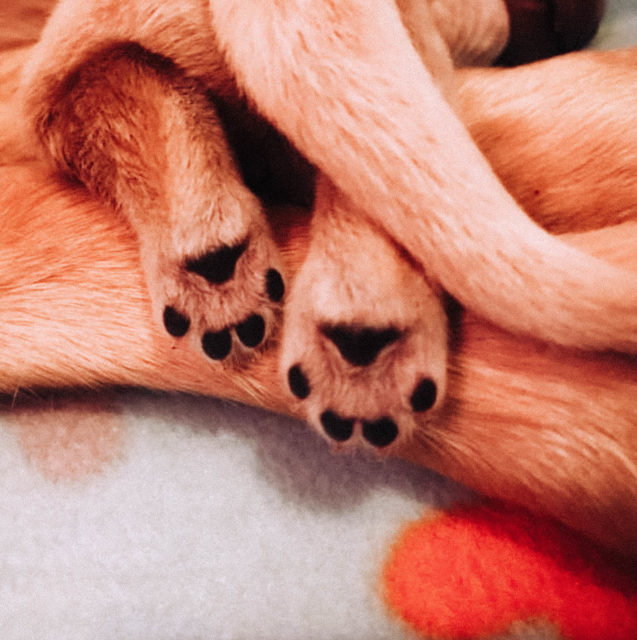
If you are looking to acquire a dog from a specific breed, with specific temperament and raised in a certain way, a breeder is the way to go.
Unfortunately, not every person who breeds dogs is a good breeder. A lot of work and knowledge goes into breeding and raising puppies. Breeding – when done correctly – is not a business to make “quick money”. This article will tell you how to distinguish between breeders who want to make a quick buck and those that are in it for the love of the dogs.
The Good, the Bad and the Ugly
According to a 2017/2018 survey, there are over 90 million dogs in the United States. Assuming an average 12 year lifespan (generally a bit longer for smaller dogs, a bit shorter for larger dogs) that means that over 7 million dogs are born every year.
The vast majority of those is not bred by good breeders. Many dog owners still believe that every female dog should have one litter, many want to have puppies off of their male dog because he is good-looking and plenty of shady breeders breed for certain colors or physical traits rather than health, structure and temperament.
Buying a dog from a poor breeder not only supports questionable practices, but can also bring you a lot of heartache and expensive vet bills later, when the dog requires extensive behavior modification or medical care.
By picking a puppy from a good breeder you set yourself up for success from the first day.
Before we start: You can download a free checklist for all aspects mentioned in this article here:
Not every person who breeds dogs is a good breeder. Simply producing puppies is easy - but finding great pairings and raising puppies with knowledge and experience is an art.
Put in the time to find a good breeder. You will be glad you did when you have a wonderful dog to enjoy for the next 12+ years.
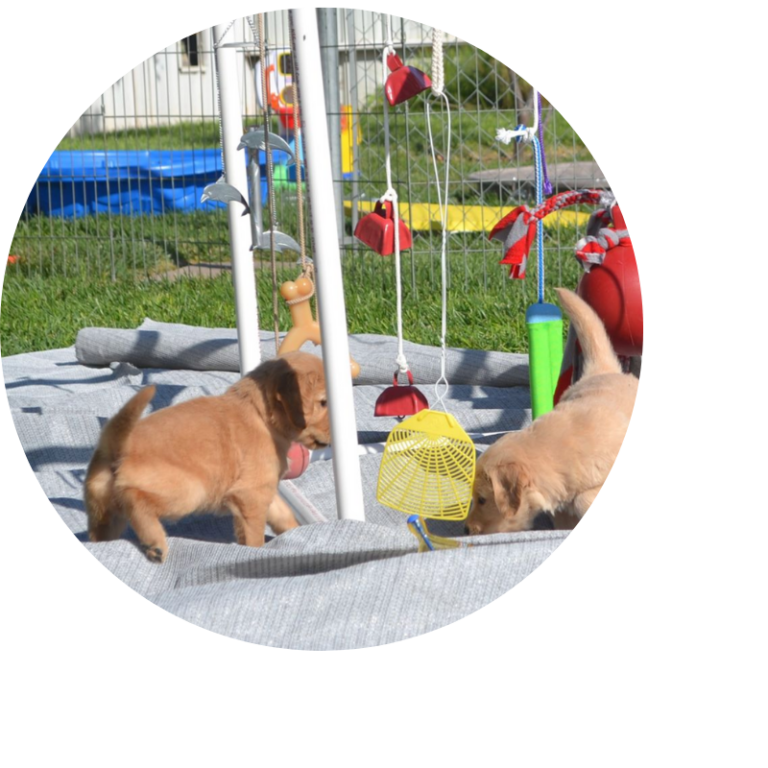
Getting In Touch With Breeders
The internet makes it easy these days to find a variety of breeders for any type of dog. A good place to start looking for a breeder is the registry of your chosen breed (more on that below) or breed-specific forums or Facebook groups.
If you have any local dog shows, visit them! They are a fantastic opportunity to see your chosen breed in-person and chat to different people who love and know the breed.
Some Etiquette
When first contacting breeders, open the conversation with questions about their breeding program and information about yourself.
You should never start the dialogue by asking for the price of a puppy.
Do not ask for prices right off the bat.
This is an email that will probably not receive a response from a good breeder. Don’t be that person:
Hi how much for a puppy?
This is does not seem like you have any interest in the breeding program, the puppy’s personality, the way he would fit in with your family … a puppy is not something from Amazon that you sort by “Lowest Price First”.
A much better way to start the conversation would for example be:

Hello,
My family is looking for a Boxer puppy to join us. We have researched different breeds and think that this one will be perfect for us. We live in Cleveland, Ohio.
Our family consists of Anna and John with our 11 year old daughter Jo. We currently don't have any pets, but we have had a Golden Retriever in the past. Our new puppy would be a companion dog who is also joining us on hiking trips.
We would like to get to know more about your breeding program as well as inquire about future litters.
We are very excited to hear more about your dogs.
Instead of asking about prices, introduce yourself to the breeder you are talking to. Suggest to chat on the phone or through email. You will definitely make a better first impression than if you open the conversation by asking about puppy prices!
When you are talking to a breeder, here are a bunch of different questions that will give you a better insight into their breeding program:
Start with the Parents
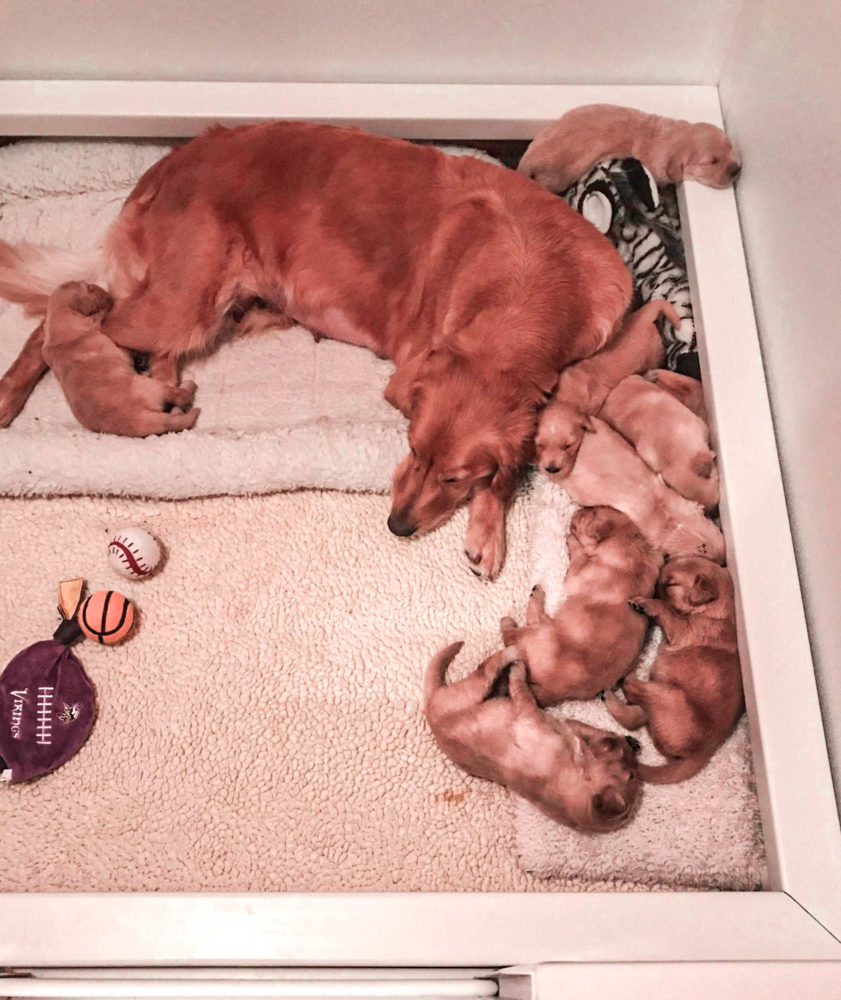
Health Tests
Health tests are breed-specific
Breed Registry
Most good breeders register their dogs with the kennel club of their country (such as the AKC for USA, CKC for Canada or FCI for Europe). Some breeders might choose to register their dogs with a different association (for example ABCA for working Border Collies).
The general requirements to belong to these clubs are not too strict and a lot of less-than-ideal breeders can and do register their dogs with a club. So – solely the fact that a breeder is a member of a club does not make them a great breeder.
However – if your breeder does not register their pure-bred dogs in any club, be very cautious. Clubs can ban breeders or not allow them to join if they do not meet minimum requirements.
Questions to Ask Your Breeder I
- What health testing has been done on the parents?
- What is their temperament like?
- How do the parents compliment each other?
- What club are the parents registered in?
- (In working dogs) What can you tell me about their working ability?
- How old are both parents?
- How many litters has the female had?
- (If the parents were bred before) What can you tell me about the offspring?
Breeding and Puppy Raising Setup
The dogs at the breeder’s home should be companions and/or working dogs. They should not exist solely for the purpose of breeding. The dogs should have adequate exercise, training and interaction.
The number of dogs that breeders have varies greatly. There is no absolute maximum number. Of course, if your breeder has thirty or forty dogs that live in small kennels, you should stay away.
However, setups vary greatly and while some breeders might be overwhelmed with four dogs, others are able to manage ten or more just fine.
You should always ask if it is possible to visit the breeder’s home (regardless of whether you are close enough to do so or not). If they say no, better move on to a different breeder. A good breeder shouldn’t have anything to hide and be proud to show you their canine family.
It should go without saying that all dogs should be in good health, have clean coats, trimmed nails etc.

The puppies should be raised in a warm, safe environment. Once they leave the whelping box they should have access to toys and stimulating objects.
Your future puppy’s brain grows and develops so much during the first months of his life – but the puppy needs sensory input for that.
If the puppies are raised in a barren room with nothing to play or interact with, stay away.
Puppy Enrichment
It is very important to ask your breeder about their puppy raising ideas. A puppy that has lived on a concrete floor with nothing to explore for the first 8 weeks of his life is going to have a much harder time than a puppy who is already a pro at navigating different surfaces, being comfortable on wobbly objects and has played with many toys.
Below are some images from wonderful breeders and their enrichment ideas:

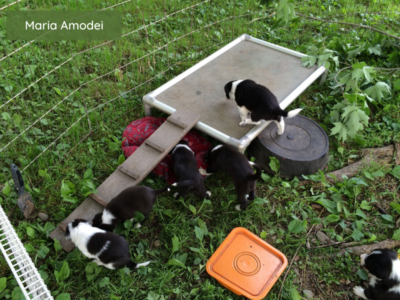
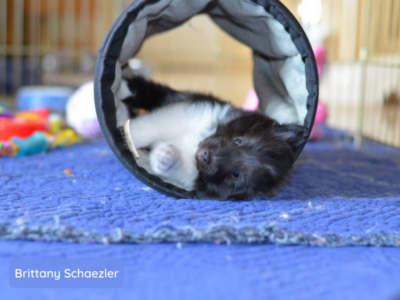
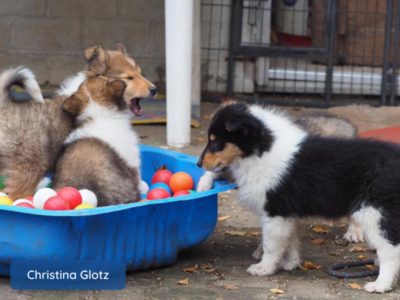
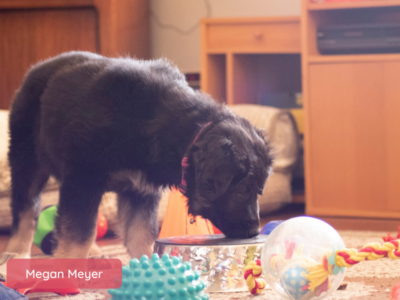

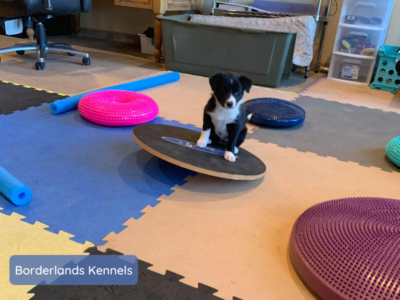
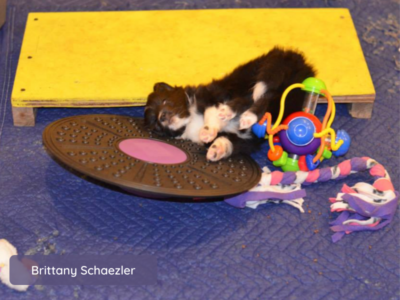

Dogs that do not get exposed to different objects, surfaces, toys etc. often show fear or apprehension against them later. As a dog trainer, I often encounter puppies that are scared of stairs, tile floors or any unstable surfaces. This is much harder to fix when the puppy is already older.
Puppies form their opinion about the world in those first few weeks and months. They need to learn that it is a happy and fun place!
Puppies should have daily interaction with their breeder, and after they are a couple weeks old also with other people. Ideally, breeders would invite for example responsible kids or other friends to come and socialize the puppies.
Every person they meet will strengthen their future temperament and set them up to me friendly, outgoing dogs.
The more positive experiences they can make now the better.
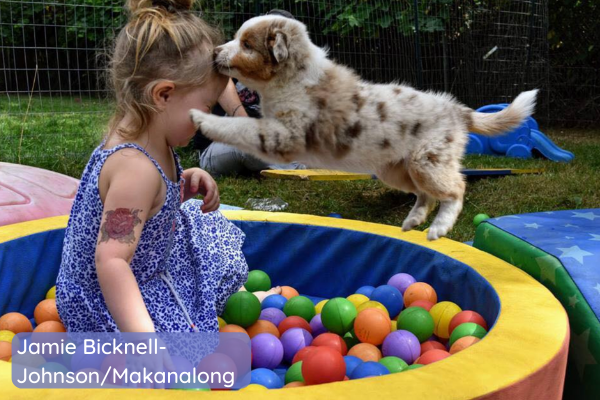
A puppy who has not met any person other than the breeder will have a harder start in his permanent family than one who is already familiar with all kinds of different people.
Especially if you are a first-time puppy owner, navigating a shy and scared puppy is hard. It is much better to set yourself up for success by picking a breeder who has already made sure your puppy will be confident and outgoing.
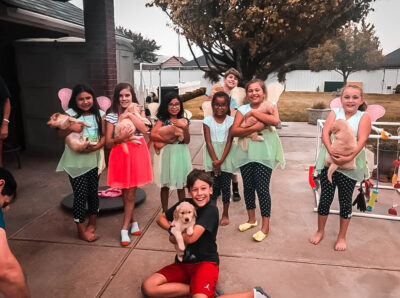
100 People
Puppies should not go to their permanent homes until they are 8 weeks old (in smaller breeds often 10-12 weeks). They are not ready to leave their littermates at 6 weeks old. If someone tries to sell you such a young puppy, look elsewhere!
Questions To Ask Your Breeder II
- What's a day in your dogs' life like?
- Where do puppies grow up?
- What kind of toys/objects/surfaces will puppies have access to?
- Who will the puppies meet during their time with you?
- How old are the puppies when they go to their new homes?
Questions For YOU
Great breeders don’t want the dogs that are so important and dear to them to go to a home that might not be a good fit for them.
Expect the breeder to ask you questions as well. These usually include your household and lifestyle as well as your general experience as a dog owner. Don’t be put off by this – it is a good sign when breeders inquire about the future homes of their puppies.
Some might also require references.
This is not a sign that they are skeptical or don’t trust you.
They simply want to make sure that the puppies they are raising will be placed in the most suitable homes. Answer all questions truthfully and admit if you do not have experience with that breed or dog in general. It will help the breeder place the right puppy with you: If for example you have never owned a working breed before, they might give you the calmest puppy of the litter.
Questions Your Breeder Might Have For You
- Who is part of your household?
- What other pets live with you?
- Where will the puppy spend his day?
- Do you have a fenced yard or other means to keep the puppy from running off outside?
- Have you owned this breed before?
- How/Where do you plan to train your puppy?
- Will you give the dog back should he at any point not fit in your life anymore?
If your breeder does not have any questions for you other than how you are going to pay, turn away. This leads us to:
Money Money Money
I often get asked how much my own dogs cost. When I say “Between $800 and $1600”, jaws drop to the floor.
More than once I was told “I would never spend that much money on a dog!”
The question is though – is that true, cumulatively throughout the dog’s life?
What will it cost to have a surgery for hip dysplasia? What will it cost to have the dog on heart medication? What will it cost to hire a behaviorist because the breeder paired two dogs with aggressive tendencies?
The initial cost of a puppy will become small compared to your dog’s lifetime (and lifetime expenses).
Do NOT be a price-shopper.
Realistically, you can expect to spend somewhere around $1000 on a well-bred puppy. This might be higher for certain breeds that have small litters, require a lot of health testing or have accomplished parents.
You will not be able to get a healthy, well-bred and well-raised puppy for $300. If someone wants to sell you one, this is not a lucky bargain – it is a scam.
While everybody will of course have an upper price limit, do not decide which breeder to choose solely based on difference in price.
Lifelong Support or Buy-And-Go?
If your breeder has been following this guide for breeding and puppy raising so far, they will probably want to stay in touch with you long after you purchase your puppy.
By the time they hand the puppy over to you, they have invested countless hours into whelping, raising and teaching the litter – and often years or decades of building their breeding program and improving their breed. The know the character of every single puppy and have gotten to know them perfectly during their time together.
Of course they want to see how their puppies turn out and how they live their lives!
Many breeders stay in contact with their puppy buyers throughout the life of the dogs. While it is a personal preference how much you want to communicate, I encourage you to send them pictures and updates every now and then – it will for sure make them happy.
This also means that responsible breeders will take a back a dog at any point during its life. Whether this is because the puppy owners’ life changed an made it impossible to have a dog anymore when the puppy is 3 months old – or 13 years.
A Good Breeder Takes Their Dogs Back
Patience Is A Virtue
There is no need to stick with the first breeder you come across. I highly recommend to talk to several breeders in the breed you chose, and also – if you know any – to friends who have purchased a dog of that breed.
While it is convenient to not travel, chances are that the one breeder who happens to have a litter on the ground within 30 miles of your home exactly when you decide you want a puppy is probably not yet the best (as we said in the beginning – many breeders are “not the best” breeders).
Talk to several and get to know them and their breed.
Maybe you will be put on a waitlist for a puppy. While it can be difficult to wait, your patience will pay off many times when you meet your well-bred friend.

There's no need to commit to a breeder or puppy right away.
It is a good idea to take some time to explore different options and make a well thought-out decision.
You will spend a big part of your time with your puppy - so make sure that he fits well into your life and family.
Setting Yourself Up For Success
As a dog trainer, the majority of all behavioral issues that I work with would be less intense or could have been prevented if the owners had researched the breed and breeder of the dog they were acquiring. In fact – I can count on one hand the number of dogs from great breeders that I saw in the last years for behavior modification.
Think of the breeder you are picking not only as the “provider” of your dog – they should be the one you can ask any question you have about the puppy, his disposition, instincts and how he fits into your family.
Responsible breeders pour so much time, thought, love (and yes – also money) into developing their breeding program, studying lines, potentially training and showing their dogs and raising their puppies.
Communicate with them to get the dog that best fits your family and lifestyle. I can guarantee that spending time to choose the right puppy from the right breeder now can save you heartache, training and expenses down the line.

No one regrets investing time to find a great breeder and getting a well-bred and well-raised puppy.
Spend time now - prevent heartache later.

